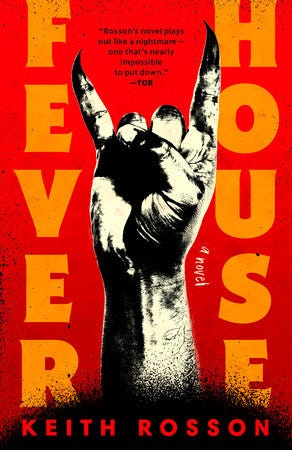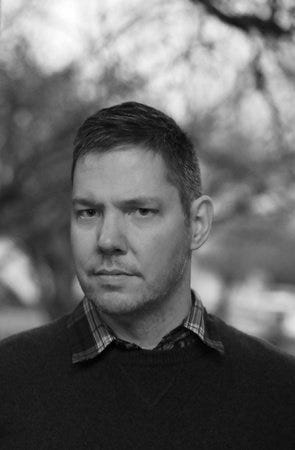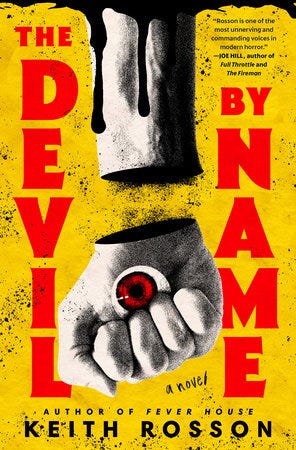I don’t recall when I first started hearing about Keith Rosson, but I learned that he was a visual artist from the Pacific Northwest who contributed to Razorcake and that he was legally blind. Like many people who find their way to the Razorcake familia, he’d been in bands but he was also a writer. When he asked me to blurb his debut novel, The Mercy of the Tide, I was blown away by it. Here’s what I wrote:
An astonishing debut soaked with suspense. Rosson brings his characters to life with surefooted precision. The town of Riptide, Oregon, may be cursed with rain, but it will be scorched into your memory. Outlandishly excellent.”
I’ll be honest, while I still remember the book vividly, I forgot that I’d blurbed it until I went looking for what I wrote on Goodreads and found this quote from Ben Loory:
a little like classic Stephen King filtered through a pacific northwest realism and shot through with a lot of understated poetry. felt like i really went somewhere for a while.
Now that’s a nice review. Keith went on to write two more novels and a short story collection—all with the indie Meerkat Press. When his collection won the Shirley Jackson award, that got the attention of Random House, and he has since published a pair of outstanding novels, Fever House in 2023 and its sequel The Devil By Name, which came out last month, that blend horror, crime, and punk rock in a way that, to paraphrase Ben, really takes the reader somewhere.
Fever House starts with a pair of low-level leg breakers on a mission to collect a debt when they come into contact with a severed hand stashed in a meth dealer’s freezer. It quickly becomes clear that this hand is… different, and all kinds of powerful forces are angling to get a hold of it, including a top secret clandestine government agency that is assisted by a being that is not of this earth. Whose hand is it and what exactly an it do? It’s all connected to a song that has the power to destroy the world.
Fever House answers the questions posed above and The Devil By Name explores the ramifications. I spoke with Keith about how Fever House got published, the writing of its sequel, and, of course, punk rock.



Jim Ruland: I’ve never read a book about a cursed object that feels the way a drug does to an addict. Can you talk about how you transmuted the desire for something that might destroy you onto the page?
Keith Rosson: It’s weird to try to look back on things and definitively say, "This is how I did it," because so much of it is kind of in the moment and it’s not like I'm taking notes about the process itself. I write books where I pick four or five things that interest me, and then I shoehorn all that shit into one book. It’s a question of stitching all of these disparate things into something that people want to read and it’s believable. Not in the sense that it’s believable like, this could really happen, but are the characters human enough where it’s compelling to read, where they’re not flat and they’re not one dimensional.
So one of those things was this hand in a doctor's bag, just that image, and then I had to start building a mythology from there. That was really the root of the book. It’s just this one image of a severed hand and a cracked leather doctor bag. A lot of it is just kind of backtracking from there, and finding out the world from that. I think the strident need the hand presents, where you need to be around it, and you want to be around it, and you want to use it, and it wants to be used in as wide of a circle as it can inhabit just kind of came organically as a plot device.
Is there something in your own life that has that vibrating, dangerous desire? Because it brought me back to some dark times in my past.
I really love writing about crime dudes. I just love it. And I love running those guys through the ringer of bad decisions, and things that quickly wheel out of their control. And so it’s tough to definitively answer. So much of Fever House was written while COVID restrictions were just being lifted. And my kids were really young, and I got a couple hours out of the day where they were at preschool. And there was a lot of compartmentalization. I’d just become a new adoptive parent, and there's a lot of terror that I was failing as a dad, and a lot of claustrophobia, because it was four of us and two dogs in a really small house. I got these couple hours where I was able to let loose. A lot of that tension and velocity went into the book.
When you were putting these things together that really interest you, was punk rock always part of the stew?
Oh yeah, I wanted to write about the kind of ’90s punk explosion and the major label feeding frenzy. And so the band that’s featured in Fever House, the Blank Letters, is kind of an amalgam of a couple vaguely specific bands, but also just that general tone of strident commercialism run up against DIY punk. So it was a fucking blast writing about the band stuff, and nerding out about their discography and all that.
That was really satisfying, to the point where I almost believed they existed by the end. I feel like the songwriter Matthew Coffin is a lot like Inger Lorre, who just passed away, and who famously walked into the office of the head of the record label and pissed on the guy's desk, which seems like a very Matthew Coffin kind of thing to do.
Absolutely. When you put out a book, marketing and publicity want you to do all this extra shit, like articles and stuff like that, and so one of the things I did was I wrote an article for Large-hearted Boy, and it was the top 10 Blank Letter songs. I got to write their discography, like their list of seven inches and all that, and then what the best 10 songs were and why. It’s very fun.
Was it a little terrifying imagining those songs, especially since the big hit is what could potentially bring on the end of the world?
Mostly it was just a question of trying to be inventive enough. I love the living shit out of Bad Religion. Love them, but my buddy’s review of them is, “All their songs sound the same!” And I'm like, “Yeah, but it's a fantastic song!” So I feel like the Blank Letters are definitely not a band where their songs are all the same. There's enough variance in them. So it’s a question of addressing that in a way that made sense and was fun to read.
Did you have fun writing the song?
I wrote the lyrics, but those are actually old. The lyrics that are reprinted in Fever House are actually from my old band. It was unused lyrics for my record. It was very fun to kind of resuscitate those.
Books that are full of occult weirdness generally tend to be set in places like temples and churches and ancient groves. Places where some ancient evil has been uncovered or disturbed. But our initial lens into this particular weirdness is through the government and how they are using the power for its project of empire building. Can you talk about that angle?
That was just one of the things that I wanted to put into the book. There’s a lot of, ephemeral stuff in Fever House like government reports and I love reading that kind of extraneous stuff in books. It’s like a treat when people put transcripts into novels or little tidbits here and there. So that was just another thing. It was one of the things that I wanted in the book, and then it’s just a question of piecing them together in a way that’s believable. But I think using the government as an avenue for exploration is a rad way to make a bad guy, too. It’s a great lens to run through as far as getting your antagonist.
So in the shorthand of what you wanted these novel to be was, was freaky X Files on the list? Like punk rock, freaky X Files, severed hand....
I also wanted the extra-terrestrial/angel guy in there with kind of an unknown origin. And I wanted him to be as undefined as I could make it. Because I think once you start to really define something, it can lose a lot of its power. People aren’t as wondrous about it then. They’re kind of like, "Oh, well, now I know."
Yeah, and it’s especially dangerous in horror. Because in real life, if we're presented with a terrifying situation, what makes it terrifying is we don't know what the fuck it is, right?
Totally and I feel like that’s why almost every movie I watch, the first two thirds of it are where the magic is, and then when it gets to be the last third and everything's just kind of revealed, it gets way less interesting. I like that ambiguity in the world-building.
Did you know all along it was going to be a two-book thing?
No, not at all. We sold Fever House to Random House in six days. It was sent out on a Wednesday, and by Tuesday we had a deal. One of the first calls with my editor, she prefaced it with, "I don't do these calls unless I’m willing to make a deal with someone and buy the book," which blew my mind because, you know, I had done four books on a small press, and so to be talking to one of the big editors at Random House was crazy. She was like, “Are you open to a sequel?” And I was like, I will write dog food copy for you if you want.
That’s the dream, to stay in the world, right?
I wrote a complete draft that was very much in keeping with the kind of crime tone of Fever House, and I tried to mirror that for the second book. And my editor was like, “It’s not working. It’s too insular and the two major plot points don’t really gel until the last 15% of the book.” It just fell flat. I wrote it fast, and I knew it. It was one of those things where you just know it’s not there yet. So I had to rewrite it from the ground up. And so maybe 10% of that first draft is what was published. I had to rewrite the whole thing.
I think that's something that a lot of people aren't aware of. Lots of times a publisher will buy a book, but then ask you to keep rewriting it until it matches their vision for it. Those visions aren’t always in alignment, so it's good that you were on the same page.
When I first started out working with my editor, I didn't know how it worked. She would give me all these suggestions, and when we finally met in person in New York last year she told me, "You don't have to do every one of those things. They're just loose suggestions." And I'm like, "My god, are you serious? I just rewrote the shit out of this book!" "Yeah, I’m looking for 30%." which blew my mind. I've really learned to trust her and my agents, because they’re essentially the only readers that I use, like beta readers, and a couple other people at my literary agency. I really trust their take on things and they haven't steered me wrong yet,
You’re an indie guy, a DIY guy, and both these books are put out by a major publisher. Do you feel any pressure to keep writing books in this particular style or in this genre, or do they support whatever you want to do.
It's kind of a combination of the two. I did the two books, Fever House and The Devil By Name, and then we did another two-book deal with them. And so I think they’re interested in books that sit in crime and horror. So I’ve already written a vampire book, and I sent that to them. Then I sent them a couple of ideas for the fourth book. They were like, “How about this one?” And that's the witch book I’m working on now. So we’ll see what happens. Ideally, they want to do a book a year with me, and so we're looking at doing another deal next year.
That crime and horror combo is right in your wheelhouse but loose enough that it’s not a straightjacket. It's not like you're going to tell them, "Well, what I really want to do is write a romantic comedy."
No, or literary fiction about a dissolving marriage. I love crime fiction and I love horror. I don't think there’s a lot of people that are doing that combination of stuff so it’s a fun room to run around in.
What can you tell us about the vampire book?
It's called Coffin Moon. It's coming out in fall or winter of 2025 and it's essentially a Vietnam veteran and his adopted daughter in 1975 taking revenge on the vampire who slaughtered their family. True Grit with vampires.
Order Fever House and The Devil By Name.



Razorcake #144 is a time machine
The new issue is out and Ms. España is on the cover. For my column, I expanded on the beer can boat races I had with my brother back when we were kids in Falls Church, Virginia
If you’re going to be in LA this weekend, go see Todd Taylor talk about zines and zine culture on Sat., Nov. 23, from 12 to 12:45pm in the Mark Taper Forum at the Los Angeles Central Library, 630 W. 5th Street, Los Angeles, CA 90071.
Later that night you should go to the Belasco Theater for L7’s Fast and Frightening Takeover. I talked to Donita Sparks, Steven McDonald, and Dani Miller about it for the LA Times. I’ll be at both events so maybe I’ll see you there!
Thanks for reading. I’ll be back next week with some book reviews to hold you over during Thanksgiving.
If you liked this newsletter you might also like my latest novel Make It Stop, or the paperback edition of Corporate Rock Sucks: The Rise & Fall of SST Records, or my book with Bad Religion, or my book with Keith Morris. I have more books and zines for sale here. I hope you’ll consider ordering my latest collaboration The Witch’s Door and the anthology Eight Very Bad Nights.
Message from the Underworld comes out every Wednesday and is always available for free, but paid subscribers also get my deepest gratitude and Orca Alert! on most Sundays. It’s a weekly round-up of links about art, culture, crime, and killer whales.



Really digging the interviews. Keep up the great work...as my reading list grows.
Good job you guys!!!